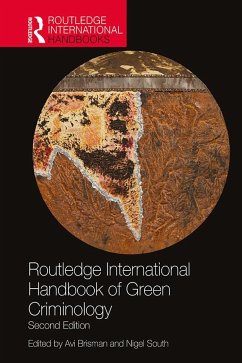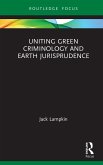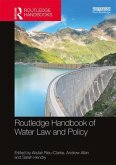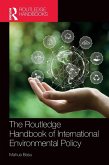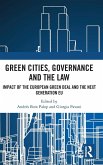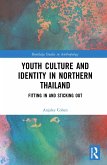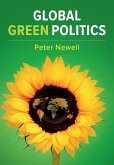Routledge International Handbook of Green Criminology
Herausgeber: South, Nigel; Brisman, Avi
Routledge International Handbook of Green Criminology
Herausgeber: South, Nigel; Brisman, Avi
- Gebundenes Buch
- Merkliste
- Auf die Merkliste
- Bewerten Bewerten
- Teilen
- Produkt teilen
- Produkterinnerung
- Produkterinnerung
The revised and expanded second edition of the Handbook reflects new methodological orientations, new locations of study such as Asia, Canada and South America, and new responses to environmental harms.
Andere Kunden interessierten sich auch für
![Routledge International Handbook of Green Criminology Routledge International Handbook of Green Criminology]() Routledge International Handbook of Green Criminology100,99 €
Routledge International Handbook of Green Criminology100,99 €![Uniting Green Criminology and Earth Jurisprudence Uniting Green Criminology and Earth Jurisprudence]() Jack LampkinUniting Green Criminology and Earth Jurisprudence78,99 €
Jack LampkinUniting Green Criminology and Earth Jurisprudence78,99 €![Routledge Handbook of Water Law and Policy Routledge Handbook of Water Law and Policy]() Routledge Handbook of Water Law and Policy368,99 €
Routledge Handbook of Water Law and Policy368,99 €![The Routledge Handbook of International Environmental Policy The Routledge Handbook of International Environmental Policy]() Mahua BasuThe Routledge Handbook of International Environmental Policy314,99 €
Mahua BasuThe Routledge Handbook of International Environmental Policy314,99 €![Green Cities, Governance and the Law Green Cities, Governance and the Law]() Green Cities, Governance and the Law204,99 €
Green Cities, Governance and the Law204,99 €![Youth Culture and Identity in Northern Thailand Youth Culture and Identity in Northern Thailand]() Anjalee CohenYouth Culture and Identity in Northern Thailand205,99 €
Anjalee CohenYouth Culture and Identity in Northern Thailand205,99 €![Global Green Politics Global Green Politics]() Peter NewellGlobal Green Politics43,99 €
Peter NewellGlobal Green Politics43,99 €-
-
-
The revised and expanded second edition of the Handbook reflects new methodological orientations, new locations of study such as Asia, Canada and South America, and new responses to environmental harms.
Hinweis: Dieser Artikel kann nur an eine deutsche Lieferadresse ausgeliefert werden.
Hinweis: Dieser Artikel kann nur an eine deutsche Lieferadresse ausgeliefert werden.
Produktdetails
- Produktdetails
- Verlag: Routledge
- 2. Auflage
- Seitenzahl: 728
- Erscheinungstermin: 27. April 2020
- Englisch
- Abmessung: 250mm x 175mm x 43mm
- Gewicht: 1413g
- ISBN-13: 9781138633803
- ISBN-10: 1138633801
- Artikelnr.: 59493520
- Herstellerkennzeichnung
- Libri GmbH
- Europaallee 1
- 36244 Bad Hersfeld
- gpsr@libri.de
- Verlag: Routledge
- 2. Auflage
- Seitenzahl: 728
- Erscheinungstermin: 27. April 2020
- Englisch
- Abmessung: 250mm x 175mm x 43mm
- Gewicht: 1413g
- ISBN-13: 9781138633803
- ISBN-10: 1138633801
- Artikelnr.: 59493520
- Herstellerkennzeichnung
- Libri GmbH
- Europaallee 1
- 36244 Bad Hersfeld
- gpsr@libri.de
Avi Brisman (MFA, JD, PhD) is an Associate Professor in the School of Justice Studies at Eastern Kentucky University (Richmond, KY, USA), an Adjunct Associate Professor in the School of Justice at Queensland University of Technology (Brisbane, Queensland, Australia), and a Conjoint Associate Professor at Newcastle Law School at the University of Newcastle (Callaghan, New South Wales, Australia). He is also Editor-in-Chief of Critical Criminology: An International Journal. Nigel South is Professor of Sociology and Director of the Centre for Criminology, University of Essex; Honorary Visiting Professor, School of Law and Social Sciences, University of Suffolk; and a visiting Adjunct Professor at the Crime and Justice Research Centre, Queensland University of Technology. He is a Fellow of the UK Academy of Social Sciences.
List of figures; List of tables; List of contributors; Preface to the
second edition of the Routledge International Handbook of Green
Criminology; Acknowledgments; Introduction: new horizons, ongoing and
emerging issues and relationships in green criminology Avi Brisman and
Nigel South; PART I History, theory and methods;1 The growth of a field: a
short history of a 'green' criminology Avi Brisman and Nigel South; 2 The
ordinary acts that contribute to ecocide: a criminological analysis Robert
Agnew; 3 Wildlife crime: a situational crime prevention perspective
Christina Burton, Devin Cowan and William Moreto; 4 Expanding treadmill of
production analysis within green criminology by integrating metabolic rift
and ecological unequal exchange theories Michael J. Lynch, Paul B.
Stretesky, Michael A. Long and Kimberly L. Barrett; 5 The visual dimensions
of green criminology Lorenzo Natali and Bill McClanahan; 6 Innovative
approaches to researching environmental crime Diane Heckenberg and Rob
White; 7 Environmental refugees as environmental victims Matthew Hall; 8
How criminologists can help victims of green crimes through scholarship and
activism Joshua Ozymy, Melissa L. Jarrell and Elizabeth A. Bradshaw; PART
II International and transnational issues for a green criminology; 9
Climate crimes: the case of ExxonMobil Ronald C. Kramer and Elizabeth A.
Bradshaw; 10 Global environmental divides and dislocations: climate
apartheid, atmospheric injustice and the blighting of the planet Avi
Brisman, Nigel South and Reece Walters; 11 Food crime and green criminology
Wesley Tourangeau and Amy J. Fitzgerald; 12 Monopolising seeds,
monopolising society: a guide to contemporary criminological research on
biopiracy David Rodríguez Goyes; 13 The War on Drugs and its invisible
collateral damage: environmental harm and climate change Tammy Ayres; 14
'Greening' injustice: penal reform, carceral expansion and greenwashing
Jordan E. Mazurek, Justin Piché and Judah Schept; PART III Region-specific
problems: some case studies; 15 The Amazon Rainforest: a green
criminological perspective Tim Boekhout van SolingeI;16 Green issues in
South-Eastern Europe Katja Eman and Gorazd Meko; 17 The Flint water
crisis: a case study of state-sponsored environmental (in)justice
Jacquelynn Doyon-Martin; 18 Indigenous environmental victimisation in the
Canadian oil sands James Heydon;19 Fracking the Rockies: the production of
harm Kellie Alexander, Tara O'Connor Shelley and Tara Opsal; 20 Corporate
capitalism, environmental damage and the rule of law: the Magurchara gas
explosion in Bangladesh Nikhil Deb; 21 Authoritarian environmentalism and
environmental regulation enforcement: a case study of medical waste crime
in northwestern China KuoRay Mao, Yiliang Zhu, Zhong Zhao and Yan Shan;
PART IV Relationships in green criminology: environment and economy; 22
E-waste in the twilight zone between crime and survival Wim van Herk and
Lieselot Bisschop; 23 The environment and the crimes of the economy
Vincenzo Ruggiero; 24 Green criminology and the working class: political
ecology and the expanded implications of political economic analysis in
green criminology Michael J. Lynch; 25 Insurance and climate change Liam
Phelan, Cameron Holley, Clifford Shearing and Louise du Toit; 26 Energy
harms: 'extreme energy', fracking and water Damien Short; 27 The
uncertainty of community financial incentives for 'fracking': pursuing
ramifications for environmental justice Jack Adam Lampkin; PART V
Relationships in green criminology: humans and non-human species; 28 A
violent interspecies relationship: the case of animal sexual assault
Jennifer Maher and Harriet Pierpoint; 29 The victimisation of women,
children and non-human species through trafficking and trade: crimes
understood through an ecofeminist perspective Ragnhild Sollund; 30 Wildlife
trafficking and criminogenic symmetries in a globalised world Daan van Uhm
; 31 Myths of causality, control and coherence in the 'war on wildlife
crime' Siv Rebekka Runhovde; 32 Environmental justice, animal rights and
total liberation: from conflict and distance to points of common focus
David N. Pellow; PART VI Relationships in green criminology: environment
and culture; 33 Environmental justice and the rights of Indigenous peoples
Angus Nurse; 34 Green crime on the reservation: a spatio-temporal analysis
of U.S. Native American reservations 2011-2015 Tameka Samuels-Jones, Ryan
Thomson and Johanna Espin; 35 The disappearing land: coastal land loss and
environmental crime Lieselot Bisschop, Staci Strobl and Julie Viollaz; 36
Toward a green cultural criminology of the South Avi Brisman and Nigel
South; 37 Consumed by the crisis: green criminology and cultural
criminology Jeff Ferrell; 38 Littering in the Northeast of England: a sign
of social disorganisation? Kelly Johnson, Tanya Wyatt, Sarah Coulthard and
Cassandra O'Neill; 39 A short conclusion concerning a questionable future
Avi Brisman and Nigel South; Index
second edition of the Routledge International Handbook of Green
Criminology; Acknowledgments; Introduction: new horizons, ongoing and
emerging issues and relationships in green criminology Avi Brisman and
Nigel South; PART I History, theory and methods;1 The growth of a field: a
short history of a 'green' criminology Avi Brisman and Nigel South; 2 The
ordinary acts that contribute to ecocide: a criminological analysis Robert
Agnew; 3 Wildlife crime: a situational crime prevention perspective
Christina Burton, Devin Cowan and William Moreto; 4 Expanding treadmill of
production analysis within green criminology by integrating metabolic rift
and ecological unequal exchange theories Michael J. Lynch, Paul B.
Stretesky, Michael A. Long and Kimberly L. Barrett; 5 The visual dimensions
of green criminology Lorenzo Natali and Bill McClanahan; 6 Innovative
approaches to researching environmental crime Diane Heckenberg and Rob
White; 7 Environmental refugees as environmental victims Matthew Hall; 8
How criminologists can help victims of green crimes through scholarship and
activism Joshua Ozymy, Melissa L. Jarrell and Elizabeth A. Bradshaw; PART
II International and transnational issues for a green criminology; 9
Climate crimes: the case of ExxonMobil Ronald C. Kramer and Elizabeth A.
Bradshaw; 10 Global environmental divides and dislocations: climate
apartheid, atmospheric injustice and the blighting of the planet Avi
Brisman, Nigel South and Reece Walters; 11 Food crime and green criminology
Wesley Tourangeau and Amy J. Fitzgerald; 12 Monopolising seeds,
monopolising society: a guide to contemporary criminological research on
biopiracy David Rodríguez Goyes; 13 The War on Drugs and its invisible
collateral damage: environmental harm and climate change Tammy Ayres; 14
'Greening' injustice: penal reform, carceral expansion and greenwashing
Jordan E. Mazurek, Justin Piché and Judah Schept; PART III Region-specific
problems: some case studies; 15 The Amazon Rainforest: a green
criminological perspective Tim Boekhout van SolingeI;16 Green issues in
South-Eastern Europe Katja Eman and Gorazd Meko; 17 The Flint water
crisis: a case study of state-sponsored environmental (in)justice
Jacquelynn Doyon-Martin; 18 Indigenous environmental victimisation in the
Canadian oil sands James Heydon;19 Fracking the Rockies: the production of
harm Kellie Alexander, Tara O'Connor Shelley and Tara Opsal; 20 Corporate
capitalism, environmental damage and the rule of law: the Magurchara gas
explosion in Bangladesh Nikhil Deb; 21 Authoritarian environmentalism and
environmental regulation enforcement: a case study of medical waste crime
in northwestern China KuoRay Mao, Yiliang Zhu, Zhong Zhao and Yan Shan;
PART IV Relationships in green criminology: environment and economy; 22
E-waste in the twilight zone between crime and survival Wim van Herk and
Lieselot Bisschop; 23 The environment and the crimes of the economy
Vincenzo Ruggiero; 24 Green criminology and the working class: political
ecology and the expanded implications of political economic analysis in
green criminology Michael J. Lynch; 25 Insurance and climate change Liam
Phelan, Cameron Holley, Clifford Shearing and Louise du Toit; 26 Energy
harms: 'extreme energy', fracking and water Damien Short; 27 The
uncertainty of community financial incentives for 'fracking': pursuing
ramifications for environmental justice Jack Adam Lampkin; PART V
Relationships in green criminology: humans and non-human species; 28 A
violent interspecies relationship: the case of animal sexual assault
Jennifer Maher and Harriet Pierpoint; 29 The victimisation of women,
children and non-human species through trafficking and trade: crimes
understood through an ecofeminist perspective Ragnhild Sollund; 30 Wildlife
trafficking and criminogenic symmetries in a globalised world Daan van Uhm
; 31 Myths of causality, control and coherence in the 'war on wildlife
crime' Siv Rebekka Runhovde; 32 Environmental justice, animal rights and
total liberation: from conflict and distance to points of common focus
David N. Pellow; PART VI Relationships in green criminology: environment
and culture; 33 Environmental justice and the rights of Indigenous peoples
Angus Nurse; 34 Green crime on the reservation: a spatio-temporal analysis
of U.S. Native American reservations 2011-2015 Tameka Samuels-Jones, Ryan
Thomson and Johanna Espin; 35 The disappearing land: coastal land loss and
environmental crime Lieselot Bisschop, Staci Strobl and Julie Viollaz; 36
Toward a green cultural criminology of the South Avi Brisman and Nigel
South; 37 Consumed by the crisis: green criminology and cultural
criminology Jeff Ferrell; 38 Littering in the Northeast of England: a sign
of social disorganisation? Kelly Johnson, Tanya Wyatt, Sarah Coulthard and
Cassandra O'Neill; 39 A short conclusion concerning a questionable future
Avi Brisman and Nigel South; Index
List of figures; List of tables; List of contributors; Preface to the
second edition of the Routledge International Handbook of Green
Criminology; Acknowledgments; Introduction: new horizons, ongoing and
emerging issues and relationships in green criminology Avi Brisman and
Nigel South; PART I History, theory and methods;1 The growth of a field: a
short history of a 'green' criminology Avi Brisman and Nigel South; 2 The
ordinary acts that contribute to ecocide: a criminological analysis Robert
Agnew; 3 Wildlife crime: a situational crime prevention perspective
Christina Burton, Devin Cowan and William Moreto; 4 Expanding treadmill of
production analysis within green criminology by integrating metabolic rift
and ecological unequal exchange theories Michael J. Lynch, Paul B.
Stretesky, Michael A. Long and Kimberly L. Barrett; 5 The visual dimensions
of green criminology Lorenzo Natali and Bill McClanahan; 6 Innovative
approaches to researching environmental crime Diane Heckenberg and Rob
White; 7 Environmental refugees as environmental victims Matthew Hall; 8
How criminologists can help victims of green crimes through scholarship and
activism Joshua Ozymy, Melissa L. Jarrell and Elizabeth A. Bradshaw; PART
II International and transnational issues for a green criminology; 9
Climate crimes: the case of ExxonMobil Ronald C. Kramer and Elizabeth A.
Bradshaw; 10 Global environmental divides and dislocations: climate
apartheid, atmospheric injustice and the blighting of the planet Avi
Brisman, Nigel South and Reece Walters; 11 Food crime and green criminology
Wesley Tourangeau and Amy J. Fitzgerald; 12 Monopolising seeds,
monopolising society: a guide to contemporary criminological research on
biopiracy David Rodríguez Goyes; 13 The War on Drugs and its invisible
collateral damage: environmental harm and climate change Tammy Ayres; 14
'Greening' injustice: penal reform, carceral expansion and greenwashing
Jordan E. Mazurek, Justin Piché and Judah Schept; PART III Region-specific
problems: some case studies; 15 The Amazon Rainforest: a green
criminological perspective Tim Boekhout van SolingeI;16 Green issues in
South-Eastern Europe Katja Eman and Gorazd Meko; 17 The Flint water
crisis: a case study of state-sponsored environmental (in)justice
Jacquelynn Doyon-Martin; 18 Indigenous environmental victimisation in the
Canadian oil sands James Heydon;19 Fracking the Rockies: the production of
harm Kellie Alexander, Tara O'Connor Shelley and Tara Opsal; 20 Corporate
capitalism, environmental damage and the rule of law: the Magurchara gas
explosion in Bangladesh Nikhil Deb; 21 Authoritarian environmentalism and
environmental regulation enforcement: a case study of medical waste crime
in northwestern China KuoRay Mao, Yiliang Zhu, Zhong Zhao and Yan Shan;
PART IV Relationships in green criminology: environment and economy; 22
E-waste in the twilight zone between crime and survival Wim van Herk and
Lieselot Bisschop; 23 The environment and the crimes of the economy
Vincenzo Ruggiero; 24 Green criminology and the working class: political
ecology and the expanded implications of political economic analysis in
green criminology Michael J. Lynch; 25 Insurance and climate change Liam
Phelan, Cameron Holley, Clifford Shearing and Louise du Toit; 26 Energy
harms: 'extreme energy', fracking and water Damien Short; 27 The
uncertainty of community financial incentives for 'fracking': pursuing
ramifications for environmental justice Jack Adam Lampkin; PART V
Relationships in green criminology: humans and non-human species; 28 A
violent interspecies relationship: the case of animal sexual assault
Jennifer Maher and Harriet Pierpoint; 29 The victimisation of women,
children and non-human species through trafficking and trade: crimes
understood through an ecofeminist perspective Ragnhild Sollund; 30 Wildlife
trafficking and criminogenic symmetries in a globalised world Daan van Uhm
; 31 Myths of causality, control and coherence in the 'war on wildlife
crime' Siv Rebekka Runhovde; 32 Environmental justice, animal rights and
total liberation: from conflict and distance to points of common focus
David N. Pellow; PART VI Relationships in green criminology: environment
and culture; 33 Environmental justice and the rights of Indigenous peoples
Angus Nurse; 34 Green crime on the reservation: a spatio-temporal analysis
of U.S. Native American reservations 2011-2015 Tameka Samuels-Jones, Ryan
Thomson and Johanna Espin; 35 The disappearing land: coastal land loss and
environmental crime Lieselot Bisschop, Staci Strobl and Julie Viollaz; 36
Toward a green cultural criminology of the South Avi Brisman and Nigel
South; 37 Consumed by the crisis: green criminology and cultural
criminology Jeff Ferrell; 38 Littering in the Northeast of England: a sign
of social disorganisation? Kelly Johnson, Tanya Wyatt, Sarah Coulthard and
Cassandra O'Neill; 39 A short conclusion concerning a questionable future
Avi Brisman and Nigel South; Index
second edition of the Routledge International Handbook of Green
Criminology; Acknowledgments; Introduction: new horizons, ongoing and
emerging issues and relationships in green criminology Avi Brisman and
Nigel South; PART I History, theory and methods;1 The growth of a field: a
short history of a 'green' criminology Avi Brisman and Nigel South; 2 The
ordinary acts that contribute to ecocide: a criminological analysis Robert
Agnew; 3 Wildlife crime: a situational crime prevention perspective
Christina Burton, Devin Cowan and William Moreto; 4 Expanding treadmill of
production analysis within green criminology by integrating metabolic rift
and ecological unequal exchange theories Michael J. Lynch, Paul B.
Stretesky, Michael A. Long and Kimberly L. Barrett; 5 The visual dimensions
of green criminology Lorenzo Natali and Bill McClanahan; 6 Innovative
approaches to researching environmental crime Diane Heckenberg and Rob
White; 7 Environmental refugees as environmental victims Matthew Hall; 8
How criminologists can help victims of green crimes through scholarship and
activism Joshua Ozymy, Melissa L. Jarrell and Elizabeth A. Bradshaw; PART
II International and transnational issues for a green criminology; 9
Climate crimes: the case of ExxonMobil Ronald C. Kramer and Elizabeth A.
Bradshaw; 10 Global environmental divides and dislocations: climate
apartheid, atmospheric injustice and the blighting of the planet Avi
Brisman, Nigel South and Reece Walters; 11 Food crime and green criminology
Wesley Tourangeau and Amy J. Fitzgerald; 12 Monopolising seeds,
monopolising society: a guide to contemporary criminological research on
biopiracy David Rodríguez Goyes; 13 The War on Drugs and its invisible
collateral damage: environmental harm and climate change Tammy Ayres; 14
'Greening' injustice: penal reform, carceral expansion and greenwashing
Jordan E. Mazurek, Justin Piché and Judah Schept; PART III Region-specific
problems: some case studies; 15 The Amazon Rainforest: a green
criminological perspective Tim Boekhout van SolingeI;16 Green issues in
South-Eastern Europe Katja Eman and Gorazd Meko; 17 The Flint water
crisis: a case study of state-sponsored environmental (in)justice
Jacquelynn Doyon-Martin; 18 Indigenous environmental victimisation in the
Canadian oil sands James Heydon;19 Fracking the Rockies: the production of
harm Kellie Alexander, Tara O'Connor Shelley and Tara Opsal; 20 Corporate
capitalism, environmental damage and the rule of law: the Magurchara gas
explosion in Bangladesh Nikhil Deb; 21 Authoritarian environmentalism and
environmental regulation enforcement: a case study of medical waste crime
in northwestern China KuoRay Mao, Yiliang Zhu, Zhong Zhao and Yan Shan;
PART IV Relationships in green criminology: environment and economy; 22
E-waste in the twilight zone between crime and survival Wim van Herk and
Lieselot Bisschop; 23 The environment and the crimes of the economy
Vincenzo Ruggiero; 24 Green criminology and the working class: political
ecology and the expanded implications of political economic analysis in
green criminology Michael J. Lynch; 25 Insurance and climate change Liam
Phelan, Cameron Holley, Clifford Shearing and Louise du Toit; 26 Energy
harms: 'extreme energy', fracking and water Damien Short; 27 The
uncertainty of community financial incentives for 'fracking': pursuing
ramifications for environmental justice Jack Adam Lampkin; PART V
Relationships in green criminology: humans and non-human species; 28 A
violent interspecies relationship: the case of animal sexual assault
Jennifer Maher and Harriet Pierpoint; 29 The victimisation of women,
children and non-human species through trafficking and trade: crimes
understood through an ecofeminist perspective Ragnhild Sollund; 30 Wildlife
trafficking and criminogenic symmetries in a globalised world Daan van Uhm
; 31 Myths of causality, control and coherence in the 'war on wildlife
crime' Siv Rebekka Runhovde; 32 Environmental justice, animal rights and
total liberation: from conflict and distance to points of common focus
David N. Pellow; PART VI Relationships in green criminology: environment
and culture; 33 Environmental justice and the rights of Indigenous peoples
Angus Nurse; 34 Green crime on the reservation: a spatio-temporal analysis
of U.S. Native American reservations 2011-2015 Tameka Samuels-Jones, Ryan
Thomson and Johanna Espin; 35 The disappearing land: coastal land loss and
environmental crime Lieselot Bisschop, Staci Strobl and Julie Viollaz; 36
Toward a green cultural criminology of the South Avi Brisman and Nigel
South; 37 Consumed by the crisis: green criminology and cultural
criminology Jeff Ferrell; 38 Littering in the Northeast of England: a sign
of social disorganisation? Kelly Johnson, Tanya Wyatt, Sarah Coulthard and
Cassandra O'Neill; 39 A short conclusion concerning a questionable future
Avi Brisman and Nigel South; Index

